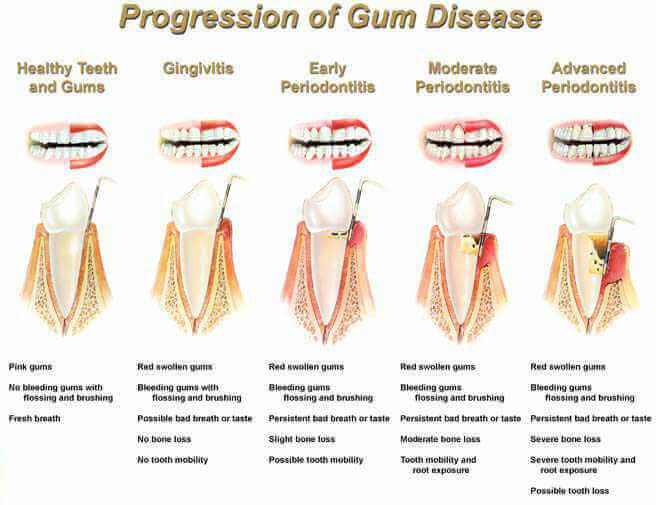In America, about 50% of adults between the ages of 30 and 90 suffer from gum disease.
What We Do
We believe in coming up with original ideas and turning them into digital work that is both innovative and measurable.
How do you know if you have gum disease? Who do you go to if you have gum disease? What kind of treatments are there for gum disease? In America, about 50% of adults between the ages of 30 and 90 suffer from gum disease. Even more unsettling than that, is the fact that many people do not even know they have it. Gum disease may lead to more complicated issues if not treated soon enough. Tooth decay, cavities, chronic bad breath, bone loss, and even losing teeth. Luckily, our practice has an experienced and excellent periodontist on staff to treat gum disease, and help you prevent it.
How Can I Tell If I Have Gum Disease?
The most common symptoms of gum disease in its early stages are bleeding gums during and after brushing your teeth or flossing, swollen gums (usually sore and red), persistent bad breath or bad taste in your mouth (mouthwash won’t help, and in fact will make your breath worse), receding gum line, and unnatural spacing between gums and teeth. Gum disease progresses painlessly, which is why people tend to ignore seeing a dentist. If you smoke, have crooked teeth, or use oral contraceptives the chances of getting gum disease increases significantly.
I Haven't Been To The Dentist In A Long Time, Do I Have Gum Disease?
Unfortunately, we cannot answer this question unless you actually come to the office. Our staff must examine your mouth in person to let you know. That is why it is absolutely imperative that you visit your dentist every 6 months for a regular cleaning. Even those with great dental habits brushing their teeth and flossing are encouraged to visit the dentist because of the hard to reach places only a dentist can clean. We don’t want to scare anyone, but the longer you wait, the more serious the issue could be and the more expensive/difficult it is to treat. Gum disease treatment, if implemented early on, will be the only way to prevent it for sure.
What Exactly Causes Gum Disease?
Diets high in sugar, smoking habits, poor dental care, excessive alcohol consumption, and lack of professional dental cleanings may lead to gum disease. The number one culprit is plaque build up. Plaque can be trapped on or in between you teeth. The sugars from drinks and food, as well as frequent smoking feed the bacteria in plaque, a sticky colorless film that forms on your teeth. The bacteria in plaque produces toxins that lead to inflammation of the gums called gingivitis. This is the bacteria that we want to clean when we brush and floss our teeth. If left unattended, plaque can lead to a serious form of gum disease known as periodontitis. At this phase, periodontitis can result in bone loss and even teeth.
My Teeth Feel Loose, Do I Have Gum Disease?
We can’t say for sure, but chances are you have advanced periodontitis, and you should see your dentist immediately before the issue becomes more severe. You probably have some bone loss already, and that may explain the increased mobility of your teeth.
How Can I Prevent Gum Disease From Ever Happening?
Regular cleanings with a hygienist will be the first step. We suggest you make an appointment every six months. The dental hygienist will use special tools to remove plaque and tartar that has built up around your teeth overtime. This is the only way to clean off tartar, do not attempt to this on your own as you might injure yourself and destroy your enamel or teeth. Some patients will need deep scaling which removes tartar below the gum line. In some instances we may use a dental laser on your gums to perform minor surgery and improve your oral health.
After your cleaning you should avoid drinking sugary drinks, drinking too much alcohol, and quit smoking. Smokers are seven times more likely to get gum disease than nonsmokers, and smoking can lower the chances of success of some gum disease treatments. Of course everyone must brush their teeth twice a day and floss at night. Avoid using mouthwash, as the alcohol content in mouthwash is bad for your gums, and may help bacteria develop resistance.
Gingivitis
Bleeding Gums And Treatment Options
Bleeding gums are the early signs of gum disease, if left untreated it can become a more serious problem down the line. Most people ignore this sign, as it is not painful, but is strongly encouraged to see your periodontist, hygienist, or dentist as soon as you can. Bleeding gums are the sign of harmful bacteria in your mouth. You need to take preventive measures to protect your overall health.
Early diagnosis is important in the case of gum disease. So call our office to set an appointment if you believe you are experiencing the early signs of gum disease.
My Gums Seem To Be Receding...
In severe cases of receding gums the dentist will perform what is known as a gingival graft. This involves removing soft tissue from the roof of the mouth or manufacturing soft tissue using our Magellian centrifuge. Taking proper care of your teeth through regular brushing and flossing will help you to maintain healthy gums.
Aggressive tooth brushing and periodontal disease are two primary causes for gum recession, which can lead to the following:
- Unattractive smile
- Root sensitivity
- Loss of supporting bone
- Tooth decay
- Plaque build-up
- Risk of future recession

